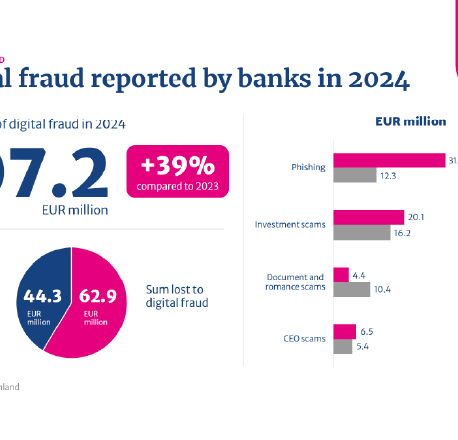
- Nearly 70% of Finns have fallen victim to digital fraud or experienced a fraud attempt, reveals a public opinion survey commissioned by Finance Finland.
- Three per cent of the fraud victims had lost a significant sum of money. In proportion to the Finnish population, this is nearly 165,000 persons.
- Finance Finland has launched a campaign to raise public awareness and knowledge of scams and fraud. The star of the campaign is Maija-Liisa Peuhu, a popular and well-loved Finnish actor.
Nearly 70% of Finns have experienced digital fraud or the attempt of digital fraud, reveals a public opinion survey conducted by Norstat Finland and commissioned by Finance Finland. According to the survey, scammers had managed to steal money from their victim in 11% of the cases. Three per cent of the respondents who had been defrauded reported that they had lost a significant sum of money. The total number of respondents was 5,500.
“In recent years, we’ve seen a noticeable uptick in the volume of different types of fraud that involves criminals seeking access to funds on Finns’ bank accounts. The results of the public opinion survey are worrying: people who haven’t experienced fraud attempts are in the minority. It is also alarming that, if we set the survey results in proportion to the total population, up to 165,000 Finns have lost a personally significant amount of money to scammers”, comments Finance Finland’s CEO Arno Ahosniemi.
Anti-fraud campaign headed by soap opera star Maija-Liisa Peuhu
Ahosniemi says the Finnish financial sector wants to be strongly involved in the fight against digital fraud. To this end, Finance Finland launched a campaign to raise public awareness and knowledge of scams and fraud. The star of the campaign is the well-loved actor Maija-Liisa Peuhu, most famous for her role in Finland’s longest running soap opera Salatut elämät. The campaign slogan is Stick it to the scammers – Catch on to fraud before it catches you.
“The volume and range of different types of digital fraud has skyrocketed just over the past few years. Banks and authorities have limited means to prevent fraud. The most valuable players are regular people themselves, because they can control their own payments as bank customers. It is vital that everyone learns to identify fraud attempts. The methods of fraud are continuously evolving, so the most valuable digital skill is a healthy level of scepticism”, Ahosniemi says.
Fraudsters do not discriminate on age or profession – Finns lost a total of €44 million in 2023
The results of the public opinion survey show that fraud does not discriminate: all age groups experience fraud attempts. Although public debate on digital literacy tends to focus on the elderly, falling to fraud is in fact more common among the younger population.
“Scammers don’t care about the age, gender or profession of the people they target. Fraud is also continuously evolving. For example, criminals are now able to build such good fake login pages to official online services that they are virtually undiscernible from the real thing. One of the campaign’s aims is to make people more aware of how they can avoid fraud and what steps they should take if they get defrauded. Our campaign website holds a lot of practical information and advice”, says Finance Finland’s Head of Security and Loss Prevention Niko Saxholm.
Nearly 30% of the survey respondents said they use digital services less than they used to because they are afraid of fraud attempts. Increased reluctance to use digital services is especially pronounced in the older age groups (60–79 years). In the survey, they were represented by 2,000 respondents.
“When you use online services, it’s good to be cautious, but there’s no need to be afraid. E-services will only become more and more prevalent due to their convenience. It’s important to teach digital literacy skills to people of all ages. We already have several good operators in this field, but there’s a growing need for instruction and advisors”, says Saxholm.
Finns lost a total of more than €44 million to digital fraud in 2023. In addition, banks were able to interrupt or reverse a total of €33 million of fraud-based transactions to scammers. The total amount of defrauded funds thus reached close to €77 million. This is more than double the amount of funds defrauded in 2022.
Visit the campaign website at www.huijaamaton.fi
Rules of thumb – Keep at least this in mind
- Be wary of any links you receive in an e-mail or text message. Don’t click on any suspicious links. Never use your banking credentials to log into a website you opened through a link someone sent you.
- Don’t disclose your online banking credentials or passwords to anyone. Remember that your bank or the authorities will never ask for your banking credentials and that they have no need for them.
- Your online banking credentials are meant for your personal use only. Don’t give them out to anyone.
- Never use a search engine to access the e-services of banks, public institutions and authorities, such as the post office, the tax authority, the police, etc.
- Always make sure you’re visiting the real website by manually typing in the full URL address or by using the service provider’s mobile application.
If you suspect you have been defrauded
- First and foremost, call the Finnish banks’ 24/7 blocking service or your own bank’s customer service to block access to your card or account. Quick action can prevent or at least mitigate damages.
- Report the offence to the police.
- Don’t suffer alone. Anyone can fall victim to fraud ‒ there is no need to be ashamed of it. Reach out to friends and family and seek professional help, if necessary.
Campaign video: Stick it to the scammers! Catch on to fraud before it catches you
Still have questions?
|Contact our experts
Looking for more?
Other articles on the topic

Finnish financial sector and authorities tested their ability to operate under severe disruptions and emergency conditions

Fraud must be tackled at the source – Social media platforms and online marketplaces need to be involved in fraud prevention

Volume of digital fraud skyrockets in Finland – Banks blocked more than €44 million’s worth of fraud-related payments in 2024

The Commission must tighten the screw on fraud prevention – Social media platforms and online marketplaces must also be involved










